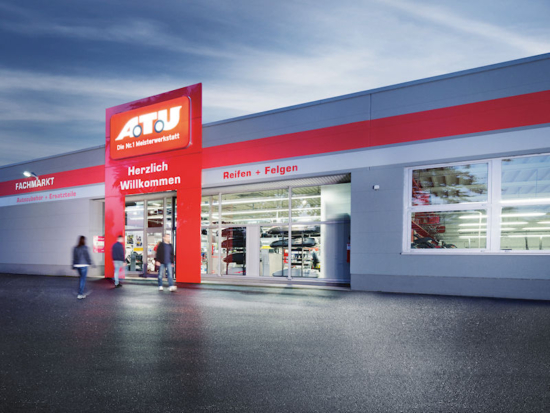Mobivia: Acquiring Michelin’s ATU shares makes sense from strategic standpoint
 Michelin has divested its 20% share in ATU, a transaction that purchaser Mobivia describes as making sense “from a strategic standpoint” (Photo: ATU)
Michelin has divested its 20% share in ATU, a transaction that purchaser Mobivia describes as making sense “from a strategic standpoint” (Photo: ATU)
Yesterday we reported that Mobivia Group had reacquired Michelin’s 20 per cent stake in ATU or would be buying it back “in the next few days,” becoming once again sole owner of the German garage and automotive parts network. At the time, Mobivia hadn’t responded to requests for further information, but a statement from company headquarters in Lille, France arrived this morning. In this statement, Mobivia confirms what Michelin already said – yes, they have reacquired the stake in ATU that Michelin acquired in 2018 for €60 million. Even though Mobivia Group contradicts the tyre maker as far as the transaction’s exact timing is concerned, the most interesting information in today’s statement lies in the reason behind the buyback. What’s more, further research shows that Michelin was unable to realise its purchase price when selling the 20 per cent stake.
According to Mobivia’s e-mailed statement, it actually repurchased the ATU shares from Michelin back in March 2022. Michelin later verified this and has corrected the information it originally supplied (which indicated a sale would take place “in the next few days”). Furthermore, the small print within Michelin’s H1 2022 Annual Report (page 23, item 1.4.5) leaves nothing in doubt: Michelin sold its stake in ATU during the first half of 2022.
The information in the Annual Report largely flew under the radar despite being publicly available since last summer. But there’s no great secret, and Mobivia’s statement offers an explanation for the ATU share buyback. It says: “The parties jointly agreed that from a strategic standpoint it makes sense to focus its future relationship on the operational tyre business.” Mobivia adds that “Michelin and ATU successfully completed their cooperation when it comes to their past stakeholdership. Business-wise both companies continue to work closely together.” It was therefore agreed that instead of a company shareholding, which from a strategic point of view they obviously considered to not or no longer make sense, in future Michelin and Mobivia would once more essentially limit themselves to a customer-supplier relationship in operational terms.
Why does a minority shareholding no longer make sense “from a strategic point of view”? There is no official answer to this question. However, we may assume that the answer is probably less related to achieving economic goals than Mobivia’s statement would like to suggest. If the return on the stake had met Michelin’s expectations, or if the shareholding had enabled it to attain other important strategic-operational goals such as “better market access” (an aim Michelin mentioned shortly after taking the stake back in 2018), the tyre maker would presumably not have sold its 20 per cent stake in ATU back to Mobivia at the apparent terms.
Unsurprisingly, Mobivia does not wish to mention the price it paid to reacquire the ATU shares; the company replied “please understand that we cannot comment on this matter.” Michelin had already indicated that it would not share details of the transaction.
However, in Michelin’s half-yearly report for the prior financial year there are a few fragments of references to the transaction. For example, at the bottom of page 47, under ‘Investments in equity-accounted companies’ the report states: “The effect of changes in scope of consolidation corresponds mainly to the disposal of ATU during the first half of the year. This transaction led to the recognition of a €16 million disposal gain.”
One thing we know for certain, Michelin acquired its 20 per cent stake in ATU in 2018 for €60 million.



Comments